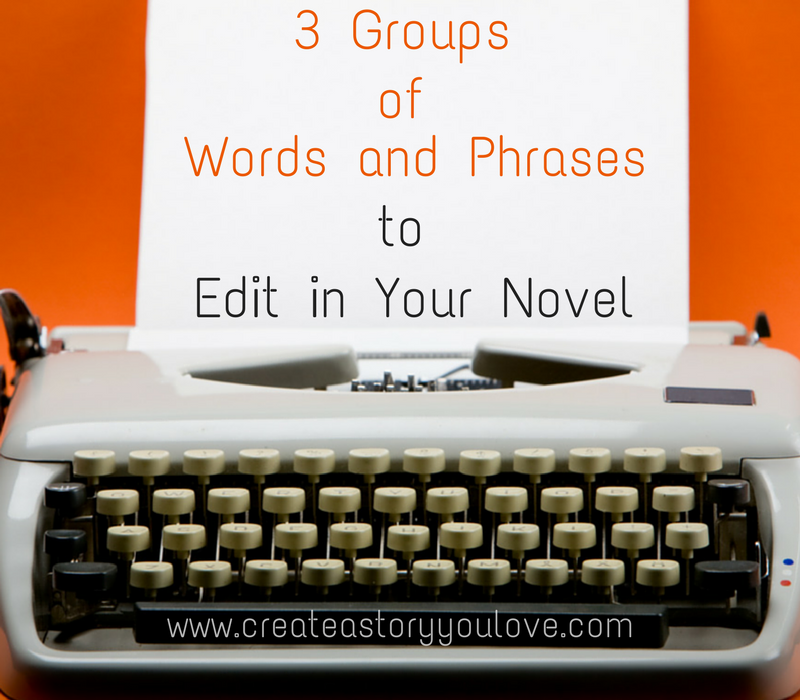Do you ever find yourself reading through your book and feeling like something is off, but not sure what needs to be changed?
If that’s you, you’re not alone.
When I was going through edits with my editor for my new release, she would send me back comments on word echoes, weasel words, cliches, repetitive words or phrases. She noticed all the things I missed… and there was a bunch of changes I needed to make.
Making changes to all those words you poured hours into creating is no fun… but it is an important part of writing a book readers love.
So, I thought I’d share some of the groups or phrases that keep popping up as I write, that I’ve needed to change or delete.

3 Groups of Words or Phrases to Edit in Your Novel
When you discover so much to either change or delete in your novel, it can feel discouraging. And sometimes you might even feel like throwing in the towel ~ if you don’t know what steps to take next.
So here’s 3 ideas that I hope will help you write a un-put-down-able novel:
1.Echo Words and Echo Phrases. These are words or phrases that are repeated 2, 3 or more times in one paragraph, or many times in the same scene. For example, in my recent novel, I repeat the words wink, nervous and anxious a lot. I’m not sure why, but there it is. So I used the thesaurus to find words that relate or I took them out completely and rewrote the sentence.
Here’s an example of Echo Words to watch for: treasured, smirk, wink, anxious, nervous, smile, frown, smile, engulfed, tag, played, playful, washed over(ie. anger washed over her; grief washed over her, etc), harboured, gasp, eventful, grip, pace, shudder, seeped, pace, swivel, turn, look, looked, looks, looking.
When a reader reads these echo words or phrases, they experience a ‘stumble’ in their reading. And as writers our goal is to for the story to flow smoothly and be as compelling as possible.
Some examples of vague, useless or weasel words are: very, wonderful, at all, often, some, maybe, really, however, of course, great, in such a way that, a bit, even, though, not true.
2.Redundant words. These are words that share the same meaning twice…. which is a needless repetition. For example, look at the phrase sit down: If you are going to sit, then it means you will be down. So you only really need the word sit. These are phrases that we hear all the time and when we write, it’s difficult not to use those redundant phrases.
Here’s some examples of redundant words or phrases: burning hot, honest truth, kneel down, climb up, sit down, stand up, crouch down, flinch back, tall giant, short midget, new recruit, free gift, sad misfortune, close proximity, new innovation, roaring noise, bare naked, completely naked, recur again, cancel out, anonymous stranger, dark-haired brunette, advance planning, true facts, dead body, suffocated to death, live witness, join together, poisonous venom, literate readers, etc.
A great book that helps you cut out extra words is You Can Write a Novel, by James V. Smith, Jr. He talks about how to Gain A Page(GAP) by having a goal to shorten every chapter by a page but cutting out extra words. This is something I want to learn how to do better as I tend to be really wordy when I write.
3.Create White Space on the Page. If you look at bestselling novels, you’ll find a few pages that don’t have as much text as other pages. The writer has created white space on the page. White space is important because it helps to pick up the pace of the story. It gives the reader’s eyes and brain a break. When there’s white space it can also highlight really great writing.
Some good ways to create white space, is by writing quick and brief dialogue. When you have a long section of dialogue with short responses, it creates white space… which can make for snappy reading. You can also add active and compelling body language to create a page-turning story.
Ultimately, we all want stories that start strong and have fresh writing that draws us in… until we type the end.
Easier said than done… I struggle with all three of these.
But I’ve been learning and working on applying these ideas to my work in progress. I hope these editing ideas help you too.
When your story has as few wasted words as possible, then the reader can start at the beginning and read right through to the end, uninterrupted.
When each word in your sentence really fits, it’s magical. That’s one of the ways your novel becomes un-put-down-able.
That’s a compelling read.
Do you have words or phrase that you need to edit during your rewriting process? What are some of your tips for making your writing fresh? I’d love to hear your thoughts in the comments… let’s learn from each other 😉
